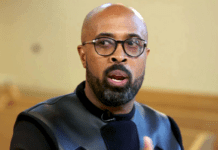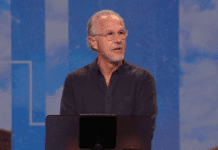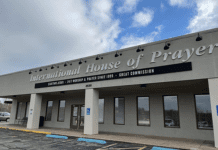The seminary is known today as the Gettysburg campus of United Lutheran Seminary, which also has a campus in Philadelphia. Sitting in the seminary’s library and leaning over an archival text, Erling, a professor of modern church history and global mission, recalled the debate with Mastriano with barely disguised frustration. She doesn’t impugn his personal faith, she said, but has little regard for his public theology.
“I don’t take him seriously as a religious voice at all. I absolutely do not,” said Erling.
Publicly criticizing Mastriano’s faith musings wasn’t something the group did lightly, she said — among other things, she and her fellow clergy had to pay for the ad themselves. But Erling argued the state senator left them no choice.
“He was saying that people should not go to the churches unless they’re complying with his ‘walk as free people,’ and that any restrictions are not of Christ,” she said. “He hit a ball into our court.”
RELATED: Republicans keep mostly mum on calls to make GOP ‘party of Christian nationalism’
According to a Pew Research survey from the time, only 6% of churches or houses of worship were conducting worship services as they had before COVID-19 struck. Some 31% were not open for in-person services at all. A separate University of Chicago Divinity School/AP-NORC poll conducted in May 2020 found that more than half (52%) of white mainline Protestants said in-person services should not be allowed.
Mastriano fired back at the Lutherans in a Facebook Live video, calling their message “hateful” and describing them as “modern Pharisees” that include people with a “hostility toward Jesus Christ.” He railed against the Evangelical Lutheran Church in America’s more liberal position on abortion rights.
“They wear the name of Christ, but they don’t act as Christians,” Mastriano said of the clergy.
Mastriano also argued that he could dismiss the pastors’ allegations, citing the Gospel of Matthew, saying they were bound to approach him as Christians before publishing their remarks. “We can completely discount their allegations, because they have a form of godliness, but deny the power thereof,” he said.
The video soon vanished from Mastriano’s Facebook page without explanation, but later that week he was asked about the ad on a local radio program. He insisted he was “not at war with any denomination” but accused the clergy of favoring his Democratic (and Lutheran) opponent, Richard Sterner.
Mastriano went on to cite the 13th chapter of the Apostle Paul‘s Letter to the Romans, a New Testament passage sometimes interpreted to mean Christians should respect the power of governing authorities. “They’re actually supposed to pray for me and support me as their government leader,” he said, referring to the Lutheran pastors. “I’m over them politically. I’m their senator. I represent them. And instead of engaging me with civility, they have a political hack job.”












